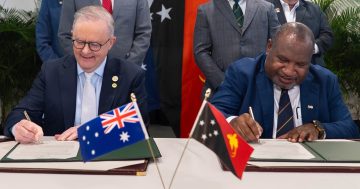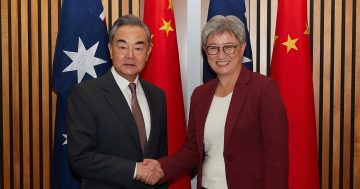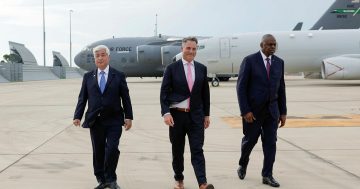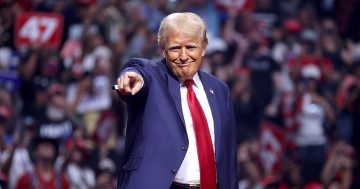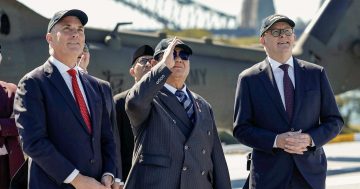Louis Devine* says the military alliance with the United States was established in geopolitical circumstances that no longer exist, making it time for a rethink about how it determines our policy.
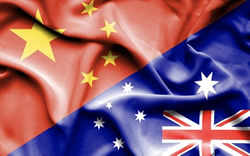 Australia’s strategic environment is undergoing the most rapid and far-reaching change since World War II.
Australia’s strategic environment is undergoing the most rapid and far-reaching change since World War II.
Despite this, Australia’s defence policy continues along old assumptions.
Specifically, Australia continues to assume that the ANZUS treaty, its military alliance with the United States, is the best way to guarantee its ongoing security.
Securing and preserving the alliance has been the bedrock of Australian security policy since the 1950s.
However, ANZUS provides no mutual defence obligation.
The treaty simply states that in the event of an armed attack, both parties must “consult together” and act “in accordance with [their] constitutional processes.”
Such loose wording is a perennial source of anxiety for Australian defence planners.
Nonetheless, ANZUS provided a baseline from which Australian Governments could work to deepen their security cooperation with the US.
After the collapse of the Soviet Union, the US enjoyed an unprecedented ‘unipolar’ moment as the world’s sole superpower.
China’s rise is bringing the unipolar moment to a close, dramatically changing Australia’s strategic outlook.
China buys one third of Australia’s exports, making it Australia’s largest trading partner by far.
On the one hand, Australia wants China to continue growing and buying Australian exports.
On the other, Australia wants its security ally, the United States, to remain the world’s strongest power.
Managing this tension is Australia’s primary geopolitical challenge.
China’s paramount strategic interest is limiting the US Navy’s ability to operate unencumbered in maritime Asia. It has learnt the lessons of history
US warships sailing through the Taiwan Strait evokes memories of China’s ‘century of humiliation’, during which it was subjugated by colonial powers from the sea.
Unsurprisingly, China is now set on undermining America’s naval presence in Asia.
Investment in nuclear submarines, anti-ship ballistic missiles, and deep-water ports in the South China Sea all form part of China’s strategy to gain control of maritime Asia.
In response, the US announced its ‘pivot’ to Asia, a stated goal which is to deploy a majority of US naval forces to the Indo-Pacific.
Clearly, the US will not give up primacy in Asia without competition and its refusal to accommodate China’s growing power threatens regional stability.
In the event of a stand-off in the South China Sea, neither the US nor China will be willing to deescalate first.
America knows that acquiescing to China in such an event would undermine allies’ faith in its commitment to the region.
A game of chicken between two warships could unintentionally escalate into major conflict.
Australia thus faces a dilemma. In tying itself closer to the US militarily, it is gambling that Washington’s strategy will succeed.
If successful, Australia can continue to enjoy US protection and the benefits of Chinese trade.
If unsuccessful, Australia could find itself dragged into conflict with its largest trading partner.
Rather than take this risk, some suggest Australia should exit ANZUS entirely, opting instead for a more neutral foreign policy.
This is overkill. Australia can and should retain the benefits of the alliance without going all the way with the USA.
Nothing in the ANZUS treaty stipulates that Australia must support every aspect of US foreign policy.
Australia’s foreign policy actions are conscious choices, and shouldn’t be excused from scrutiny by hiding behind a treaty.
Calling for Australian independence within the alliance has become a cliché, but that doesn’t make it impossible.
A more independent foreign policy will still speak up against China when it is in Australia’s interests to do so.
Australia’s current proposal for an independent inquiry on the origins of COVID-19 is in the global interest and has merit regardless of what the White House wants.
Chinese political interference, where present, should be exposed and countered.
Australia should not however, continue to purchase military equipment designed to assist the US in a high-intensity maritime conflict, such as the Air Warfare Destroyers and Amphibious Carriers.
America’s trade war with China is not in Australia’s interest, and a more independent stance should make that clear.
* Louis Devine holds an honours degree from the University of Melbourne in International Relations and Philosophy. He tweets at @LouisDevine13
A full version of this article appears on the Australian Institute of International Affairs’ Outlook page — [email protected]





